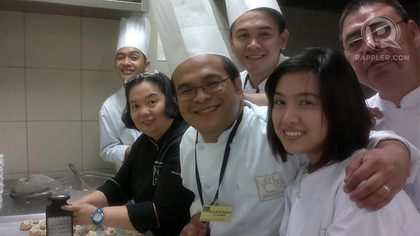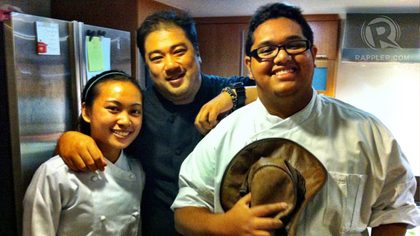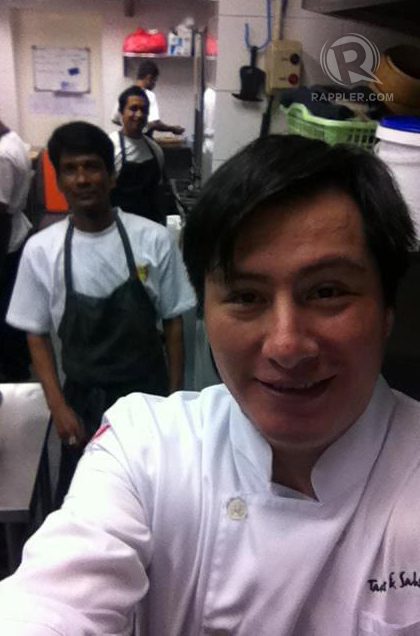SUMMARY
This is AI generated summarization, which may have errors. For context, always refer to the full article.

MANILA, PHILIPPINES – Imagine the pure pleasure you derive out of having a mouthful of al dente rigatoni with fresh uni cream sauce sprinkled with chive bits and nori strips…
or of lightly-seared large Hokkaido scallops with a drizzle of reduced balsamic vinegar, accompanied by crisp and nutty baby arugula leaves…
or of steamed delectable vegetable dumplings with a drizzle of white truffle oil…
or of medium-rare grilled French-Lebanese lamb shoulder kebabs paired with frisee and onions with a light lemony vinaigrette…
or of a lightly chilled pot de crème of Valrhona chocolate…
Hmmm… yummmm… weeeee… with eyes closed… and with our eyes now smiling… we anticipate the next bite, the next course…
It’s ultimately pure heaven… almost sheer pleasure, isn’t it?
But do you honestly ever think of the chefs and cooks who make these wonderful, breath-taking creations for us?
“The ones pure at heart are the ones who excel in the art of cooking.” – R.L.Brown
I interviewed 4 chefs to find out what it takes to be one, why they chose to be one, what their days are like, the challenges they face, what brings them joy, what leaves them unsatisfied, what else they would like to do or where else they would like to be.
Three of them are male, one female; 3 of them Asians, one Latin American; two of them working in a foreign country, the other two working in their home country; one combining teaching in a cooking school and being chef patron of a restaurant; one an executive chef of a hotel chain, responsible for 6 hotel units; one owner and chef for a food-related events company; and the other an executive chef in Malaysia, while still maintaining another restaurant in Thailand.
All chefs had either or both formal culinary education with extensive training and actual experience in cooking and management.
A diner’s appreciation for good food does not necessarily translate to a conscious appreciation of the chefs and cooks that create them.
Diners are often too focused on the food, or on the company at the table. And yet, chefs and cooks keenly watch out for their guests’ reactions to their creations!

“I really just love seeing people happy and eating my food. I love watching them interact, form friendships, share ideas, all while enjoying what I’ve cooked. When they say ‘thank you — that was an excellent meal and I’m stuffed and happy’ — that makes me happy,” says JJ Yulo, chef and owner of Pinoy Eats World.
Jorge Bernal, a Mexican executive chef working in Kuala Lumpur, says, “Seeing my customers happy with my product is something that is hard to achieve; but when you reach that level, you will never want to go back.”
Gratitude and appreciation are sources of joy for many of the chefs I interviewed, as these are the culmination of each chef’s creative work.
The opportunity to actualize one’s creativity seems to be a motivation for a number of chefs.
“I find in the food planning and preparation the way to express my passion for doing creative things,” says executive chef Jorge Bernal, an architect and sound engineer by training. “I knew I wanted to be a chef when I saw the satisfied faces of my friends for whom I made French toast for breakfast. As a child, I often made popcorn, some breakfast and milk shakes for my family.”
He adds, “There was especially one Fig milk shake that every one in my family loved, and I still remember how to make it.”
Saying no to more traditional jobs, and instead following one’s passion and being a chef, seems to be another.
Mia Ayuyao Manuel — chef patron of Lolo Dad’s Restaurant in Manila — together with husband chef Ariel Manuel says, “I like working in the kitchen. It’s not a typical 8 to 5 routine office work. I get to meet a lot of people from all walks of life.”
Foodie chef JJ Yulo says, “I’m really more a ‘student’ of food… constantly trying to learn stuff. I got into it by accident: when my graphic and web design business failed. Food’s always been something I’ve been interested in.”
Being a chef most often entails formal education and on the job training.
Both executive chefs interviewed have had extensive experience as chefs in foreign countries (Thailand and Malaysia). Three of the chefs interviewed had formal education in the USA; one at the California Culinary Academy and another at the Institute of Culinary Education in New York. All have had on-the-job trainings in various restaurants and hotels all over the world.
All speak of very long hours at work — at least 12-14 hours a day.
Executive chef Jorge Bernal of Loco Mexican Bar and Restaurant in Changkat Bukit Bintang, Malaysia, says he has long work days, too. “(The) restaurant business is very demanding and seems like 24 hours’ work. From the time I wake up, I check my email, read or review new recipes… until the time I have to go to the restaurant. There, I check if the sauces are ready, with the flavor according to how I want them to be. Then I make sure that we have all the menu in stock and I meet with my chefs.”

He continues, “In the evening when we get busy, I go outside the kitchen and check that the tables are served right; I make sure that the patrons are happy and comfortable. I also recommend food and drinks to them, and I am happy to talk about my food with them and answer their questions.
“Later in the evening, I have a short meeting with the owners and we exchange suggestions and ideas for daily improvement. I finish my work at 3 AM and I just go back home to read the news and then get ready to sleep and get ready for another day.”
“My day starts at 7 AM in the cooking school and ends at 11 PM in the restaurant,” says chef patron Mia Ayuyao-Manuel. “With my teaching work, as soon as I get to school, I check if all ingredients are complete, check my lecture and check on the lecture room. When I get to Lolo Dad’s, I check the number of reservations for the day. Re-check if the suppliers have delivered orders, and if not, I do some purchasing. That is restaurant work. You really need to love the kitchen to stay in the kitchen for a minimum of 12 hours.”
Long work hours for chefs mean they hardly have any free time left. Real devotion to the work is demanded by the job.
Says one, “People working in F&B don’t actually have a smooth social life. When others work, we work; when others are on holiday, we work; when others are asleep, we work; and finally when others are awake, we still work.”
A chef who is single and working in a foreign country unwinds late after work by partying out with friends or making overseas calls to his widowed mother. Chef Mia says, “The disadvantage of being a chef is you really do not get to spend too much time with the family especially on special celebrations like Christmas and New Year.” A married woman, Chef Mia unwinds by enjoying the company of her spouse and son, going to see movies or meeting up with friends after work.
Another simply goes home, “grabs a bite to eat, maybe with a cold beer, takes a long hot shower and watches some TV.” Chef Jorge “just works on his computer, reads the news, does social networking through Facebook, watches other chefs’ videos and talks to friends.”
What leaves them tired and unsatisfied?
For JJ Yulo who owns Pinoy Eats World, a Manila-based company that focuses on food-related events, “the worst part is when unforeseen stuff happens and it just brings the mood down. That and the nightmare that is logistics — carrying stuff to and fro.”
For Chef Jorge, it is “to see and listen to people who don’t open their minds to new experiences, and who judge with no basis and leave me with no option but to grin and bear it. I don’t like that in terms of business there are some limitations that prevent me from doing more.”
Chef Mia says, “I get tired when I know I did not do enough at work or I am not fully satisfied with the work I did.”

No matter the long hours, hard work and challenges, chefs seem to love what they do and do what they love. And this is reflected in the food creations that they produce.
The next time you eat at a restaurant and have a lovely dinner, make sure to give a sincere word of appreciation to the chef! – Rappler.com
Click on the links below for more.
- Asia’s biggest wine expo opens in Hong Kong
- [Food Porn] Kuisinero and the first kiss
- [FOOD PORN] Patriotic Tapa (naks!)
- [Food Porn] Crispy cravings
Add a comment
How does this make you feel?
There are no comments yet. Add your comment to start the conversation.